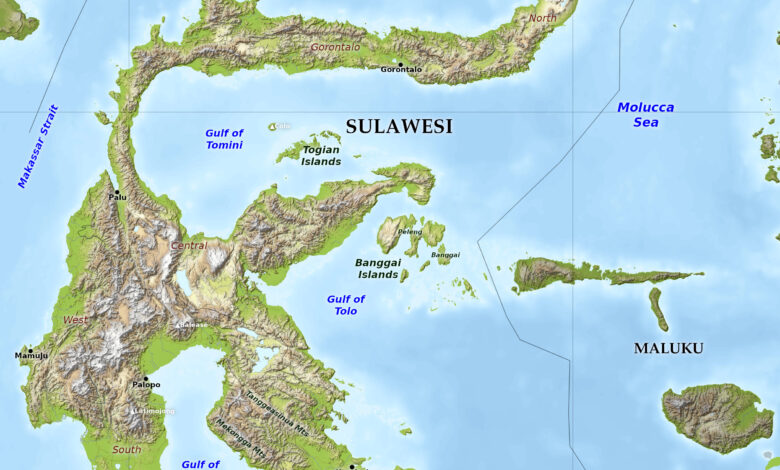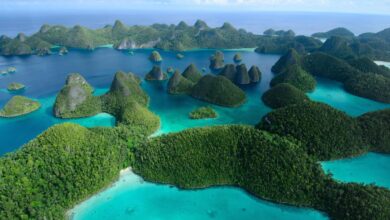Discover Sulawesi’s Wonders: Indonesia’s Hidden Gem

Introduction to Sulawesi
Sulawesi, formerly known as Celebes, is an island in Indonesia, situated between the islands of Borneo and the Maluku Islands. With a total area of approximately 174,600 square kilometers, Sulawesi is the world’s eleventh-largest island and the fourth-largest island in Indonesia. The island is divided into six provinces: Gorontalo, North Sulawesi, Central Sulawesi, West Sulawesi, South Sulawesi, and Southeast Sulawesi. Sulawesi is known for its unique culture, rich biodiversity, and stunning natural beauty, making it a fascinating destination for tourists, researchers, and adventurers alike.
Geography and Climate
Sulawesi is characterized by its distinctive shape, often described as resembling a “K” or a “broken letter K”. The island is mountainous, with several peaks exceeding 3,000 meters in height. The highest peak, Mount Latimojong, is located in the Luwu region of South Sulawesi and stands at 3,478 meters above sea level. Sulawesi’s geography is also marked by numerous lakes, rivers, and coastal areas, including the Gulf of Tomini and the Gulf of Bone. The island’s climate is generally tropical, with high temperatures and high humidity levels throughout the year. The dry season typically runs from May to October, while the wet season occurs from November to April.
History and Culture
Sulawesi has a rich and diverse cultural heritage, with over 100 ethnic groups inhabiting the island. The island’s strategic location has made it an important hub for trade and cultural exchange between Asia, Europe, and the Middle East. The earliest known inhabitants of Sulawesi were the Austronesian people, who arrived on the island around 2,000 BCE. Later, the island was influenced by Hinduism, Buddhism, and Islam, which were introduced by traders and travelers from India, China, and the Middle East. Today, the majority of Sulawesi’s population practices Islam, while Christianity and traditional animist beliefs are also prevalent. The island is home to numerous traditional festivals and ceremonies, including the Tonasa Festival in South Sulawesi and the Minahasa Festival in North Sulawesi.
Biodiversity and Conservation
Sulawesi is renowned for its exceptional biodiversity, with many unique and endemic species found nowhere else on Earth. The island is home to several national parks, including the Lorentz National Park, which is a UNESCO World Heritage Site, and the Bogani Nani Wartabone National Park. Sulawesi’s forests are inhabited by a wide range of wildlife, including the anoa (a small buffalo), the babirusa (a pig-like mammal), and the macaque (a type of monkey). The island’s coral reefs are also home to an incredible array of marine life, including sea turtles, dolphins, and whales. However, Sulawesi’s biodiversity is facing numerous threats, including deforestation, habitat destruction, and climate change, making conservation efforts a pressing priority.
Economy and Infrastructure
Sulawesi’s economy is primarily driven by agriculture, with major crops including rice, maize, and cocoa. The island is also rich in natural resources, including nickel, gold, and copper. The fishing industry is another significant sector, with Sulawesi’s coastal waters providing a rich source of seafood. In terms of infrastructure, Sulawesi has several major airports, including the Sultan Hasanuddin International Airport in Makassar and the Sam Ratulangi International Airport in Manado. The island’s road network is also well-developed, with several major highways connecting the provinces. However, Sulawesi’s infrastructure is still facing challenges, including limited access to electricity and clean water in rural areas.
Tourism in Sulawesi
Sulawesi is a hidden gem for tourists, offering a unique and unforgettable experience. The island’s stunning natural beauty, rich culture, and friendly people make it an ideal destination for adventure seekers, nature lovers, and culture enthusiasts. Some of the top tourist attractions in Sulawesi include:
- Tana Toraja: A region in South Sulawesi known for its unique culture and traditional funeral rituals.
- Bunaken National Park: A marine park located off the coast of Manado, known for its incredible coral reefs and marine life.
- Lake Matano: A deep lake located in East Luwu, known for its stunning scenery and unique wildlife.
- Mount Latimojong: The highest peak in Sulawesi, offering breathtaking views and hiking opportunities.
- Makassar: The capital city of South Sulawesi, known for its rich history, cultural attractions, and delicious seafood.
Things to Do in Sulawesi
There are numerous activities and experiences to enjoy in Sulawesi, including:
- Diving and snorkeling: Explore the island’s incredible coral reefs and marine life.
- Hiking and trekking: Discover the island’s stunning natural beauty and unique wildlife.
- Cultural tours: Learn about the island’s rich culture and history, and experience traditional festivals and ceremonies.
- Food and drink: Sample the island’s delicious cuisine, including fresh seafood, traditional dishes, and local coffee.
- Water sports: Enjoy surfing, kayaking, or paddleboarding in the island’s beautiful coastal areas.
Challenges and Opportunities
Despite its many attractions and advantages, Sulawesi faces several challenges, including:
- Infrastructure development: Improving access to electricity, clean water, and transportation in rural areas.
- Conservation efforts: Protecting the island’s unique biodiversity and natural resources.
- Poverty reduction: Addressing poverty and inequality, particularly in rural areas.
- Climate change: Mitigating the impacts of climate change, including rising sea levels and changing weather patterns.
However, Sulawesi also offers numerous opportunities, including:
- Tourism development: Developing sustainable tourism initiatives that benefit local communities and conserve the island’s natural resources.
- Investment and trade: Attracting investment and promoting trade in key sectors, including agriculture, mining, and manufacturing.
- Education and research: Promoting education and research initiatives that support the island’s development and conservation efforts.
- Community engagement: Engaging with local communities and promoting cultural exchange and understanding.
Conclusion
Sulawesi is a unique and fascinating island, offering a rich cultural heritage, stunning natural beauty, and incredible biodiversity. While the island faces several challenges, it also offers numerous opportunities for development, conservation, and cultural exchange. By promoting sustainable tourism, investing in infrastructure and education, and supporting conservation efforts, Sulawesi can unlock its full potential and become a model for sustainable development in Indonesia and beyond.
Appendix: Useful Information
For travelers and researchers planning to visit Sulawesi, here are some useful tips and information:
- Language: The official language is Indonesian, but many local languages are also spoken, including Bugis, Makassarese, and Minahasa.
- Currency: The Indonesian rupiah (IDR) is the local currency.
- Time zone: Sulawesi is in the Central Indonesia Time (CIT) zone, which is UTC+8.
- Visa requirements: Citizens of certain countries, including the United States, Canada, and the European Union, can enter Indonesia without a visa for tourism and business purposes.
- Vaccinations: Consult your doctor or a travel clinic for advice on recommended vaccinations and medications.
- Safety and security: Take normal precautions to ensure your safety and security, including avoiding traveling alone at night and using reputable transportation services.
By being aware of these useful tips and information, you can have a safe and enjoyable trip to Sulawesi, and make the most of your experience on this incredible island.









